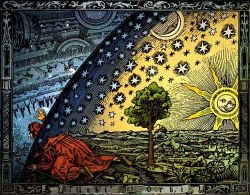
Gaeilge | Galego | Ελληνικό | בעברית | Italiano | 日本語 | 한국어 | Македонски | Magyar | Nederlands
Norsk | Polski | Português | Русский | Română | slovenščina | srpskohrvatski | Svenska | Türkçe | اُردو | Tiếng Việt
Science & Technology
Quantum mechanics: on the cusp of a scientific revolution?
 Since the 1930s a dominant trend has existed within the scientific community and popular science that explains quantum mechanics with all kinds of idealistic and mystical interpretations. Dominant within this school of idealism has been the “Copenhagen interpretation” of quantum mechanics, which originated with academics such as Niels Bohr and Werner Heisenberg who were based in the Danish capital.
Since the 1930s a dominant trend has existed within the scientific community and popular science that explains quantum mechanics with all kinds of idealistic and mystical interpretations. Dominant within this school of idealism has been the “Copenhagen interpretation” of quantum mechanics, which originated with academics such as Niels Bohr and Werner Heisenberg who were based in the Danish capital.
The Role of the State in the Space Race
 On June 23, 1905, Orville Wright became the first person to successfully fly a powered aircraft. Just 56 years later, in April 1961, Yuri Gagarin became the first person in space, when Vostok 1 made a successful orbit of the Earth. Flight, and later space travel, were viewed as an indication of humanity’s progress and ability to overcome even the most enormous of obstacles, in this case, the Earth’s gravitational pull. But the recent explosion of Orbital Sciences Corporation’s Antares rocket on October 28, and the explosion of Virgin Galactic’s SpaceShipTwo just a few days later seem to highlight the primary obstacle in the way of humanity’s development today: the private ownership of the means of production.
On June 23, 1905, Orville Wright became the first person to successfully fly a powered aircraft. Just 56 years later, in April 1961, Yuri Gagarin became the first person in space, when Vostok 1 made a successful orbit of the Earth. Flight, and later space travel, were viewed as an indication of humanity’s progress and ability to overcome even the most enormous of obstacles, in this case, the Earth’s gravitational pull. But the recent explosion of Orbital Sciences Corporation’s Antares rocket on October 28, and the explosion of Virgin Galactic’s SpaceShipTwo just a few days later seem to highlight the primary obstacle in the way of humanity’s development today: the private ownership of the means of production.
The Crisis of Cosmology - Part three
 The various unsolved mysteries in physics described above are no secret. The scientific community is fully aware of the challenges they face. The search for the solution to these problems has yielded many candidates, none of which can yet claim victory. What is remarkable, however, is just how little the field of cosmology has advanced in the last few decades.
The various unsolved mysteries in physics described above are no secret. The scientific community is fully aware of the challenges they face. The search for the solution to these problems has yielded many candidates, none of which can yet claim victory. What is remarkable, however, is just how little the field of cosmology has advanced in the last few decades.
The Crisis of Cosmology - Part two
 The other three main pillars of cosmology– quantum mechanics, the SMPP, and general relativity – are not without glaring problems. In most cases, these are of a more theoretical, dare it be said, philosophical nature.
The other three main pillars of cosmology– quantum mechanics, the SMPP, and general relativity – are not without glaring problems. In most cases, these are of a more theoretical, dare it be said, philosophical nature.
The Crisis of Cosmology - Part one
 Since the dawn of civilisation, humans have questioned the workings of the natural world around them and their own place in the Universe. Through a long process of investigation over millennia, mankind has built up an understanding of Nature and the wider cosmos. Each successive generation has expanded the horizon of our knowledge and in the process extended the boundary of the known Universe. From Ptolemy and Copernicus and through to the modern day, at every stage scientific discoveries have refined and redefined our picture of the Cosmos and our place within it.
Since the dawn of civilisation, humans have questioned the workings of the natural world around them and their own place in the Universe. Through a long process of investigation over millennia, mankind has built up an understanding of Nature and the wider cosmos. Each successive generation has expanded the horizon of our knowledge and in the process extended the boundary of the known Universe. From Ptolemy and Copernicus and through to the modern day, at every stage scientific discoveries have refined and redefined our picture of the Cosmos and our place within it.
Ebola: an epidemic made in the capitals of Europe and America
Food and the Socialist Revolution
 Americans’ dysfunctional relationship with food is regularly lamented or mocked in the media and in academia. What is never explained is the root cause of this dysfunction. Marxism explains that conditions determine consciousness. Your physical and social environment heavily influences the choices you make by limiting the very choices that are available to you.
Americans’ dysfunctional relationship with food is regularly lamented or mocked in the media and in academia. What is never explained is the root cause of this dysfunction. Marxism explains that conditions determine consciousness. Your physical and social environment heavily influences the choices you make by limiting the very choices that are available to you.
More Articles...
Page 1 of 11
Related articles
More categories
The Pan-American School
Donate to help bring comrades to the Pan-American school.
[Read the appeal]













